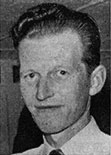1956 Summer Olympics / Athletics - 20 km walk (men)
|
|
|||||||||

|
|||||||||
| sport | athletics | ||||||||
| discipline | 20 km walk | ||||||||
| gender | Men | ||||||||
| Attendees | 21 athletes from 10 countries | ||||||||
| Competition location |
Melbourne Cricket Ground (start and finish) |
||||||||
| Competition phase | November 28, 1956 | ||||||||
|
|||||||||
The men's 20 km street at the 1956 Olympic Games in Melbourne was held on November 28, 1956. 21 athletes took part, 17 of which made it to the finish. The start and finish was the Melbourne Cricket Ground . This competition was held for the first time at the Olympic Games. It replaced the 10 km train walk.
The Soviet walkers achieved a triple success. Leonid Spirin won ahead of Antanas Mikėnas and Bruno Junk .
Swiss and Austrian walkers did not take part. The German walker Dieter Lindner was disqualified.
Existing records
| World best | 1:30:00 h |
Josef Doležal Czechoslovakia |
Prague , Czechoslovakia | July 25, 1956 |
| Olympic record | Discipline Olympic for the first time - therefore no Olympic record has been set so far | |||
Note: World records are not set in street walking because of the different track conditions.
Race course
Date: November 28, 1956, 2:50 p.m.
The walkers left the stadium after one lap on the cinder track and now had eight laps to complete on the streets around the stadium. Then it was back to the stadium to cross the finish line. The first Olympic champion on this distance was the Soviet walker Leonid Spirin with a winning time that was just one and a half minutes above the world record of the 1954 European champion in Bern over the 10 km distance, Josef Doležal. Doležal himself, one of the favorites in Melbourne , had to give up the race. Silver and bronze went to Antanas Mikėnas and Bruno Junk, both compatriots of the Olympic champion, so that there was a three-time Soviet success here.
The Soviet walkers achieved the only triple success in this Olympic walking.
Result
| space | Surname | nation | time | annotation |
|---|---|---|---|---|
| 1 | Leonid Spirin |
|
1: 31: 27.4 h | first OR |
| 2 | Antanas Mikėnas |
|
1: 32: 03.0 h | |
| 3 | Bruno Junk |
|
1: 32: 12.0 h | |
| 4th | John Ljunggren |
|
1: 32: 24.0 h | |
| 5 | Stan Vickers |
|
1: 32: 34.2 h | |
| 6th | Donald Keane |
|
1: 33: 52.0 h | |
| 7th | George Coleman |
|
1: 34: 01.8 h | |
| 8th | Roland Hardy |
|
1: 34: 40.4 h | |
| 9 | Giuseppe Dordoni |
|
1: 35: 00.4 h | |
| 10 | Ted Allsopp |
|
1: 35: 43.0 h | |
| 11 | Abdon Pamich |
|
1: 36: 03.6 h | |
| 12 | Henry Laskau |
|
1: 38: 46.8 h | |
| 13 | Ronald Crawford |
|
1: 39: 35.0 h | |
| 14th | Dumitru Paraschivescu |
|
1: 39: 35.0 h | |
| 15th | Ion Barbu |
|
1: 41: 37.8 h | |
| 16 | Bruce MacDonald |
|
1: 43: 25.6 h | |
| 17th | James Hewson |
|
1: 46: 24.8 hours | |
| DSQ | Josef Doležal |
|
||
| Lars Hindmar |
|
|||
| Dieter Lindner |
|
|||
| Alex Oakley |
|
literature
- Ekkehard zur Megede , The History of Olympic Athletics, Volume 2: 1948–1968, Verlag Bartels & Wernitz KG, Berlin, 1st edition 1969, p. 138
Web links
- SportsReference 20km Walk , accessed October 5, 2017
- Official report p. 319f, engl. (PDF), accessed on October 5, 2017
- Juegos Olímpicos Melbourne 1956, 20km marcha , published April 13, 2013 on youtube.com, accessed October 5, 2017
Individual evidence
- ↑ IAAF Statistics Handbook, Berlin 2009, page 566 ( Memento from June 29, 2011 in the Internet Archive )
- ^ Official report p. 284, engl. (PDF), accessed on October 5, 2017
- ^ Official report p. 319, engl. (PDF), accessed on October 5, 2017

